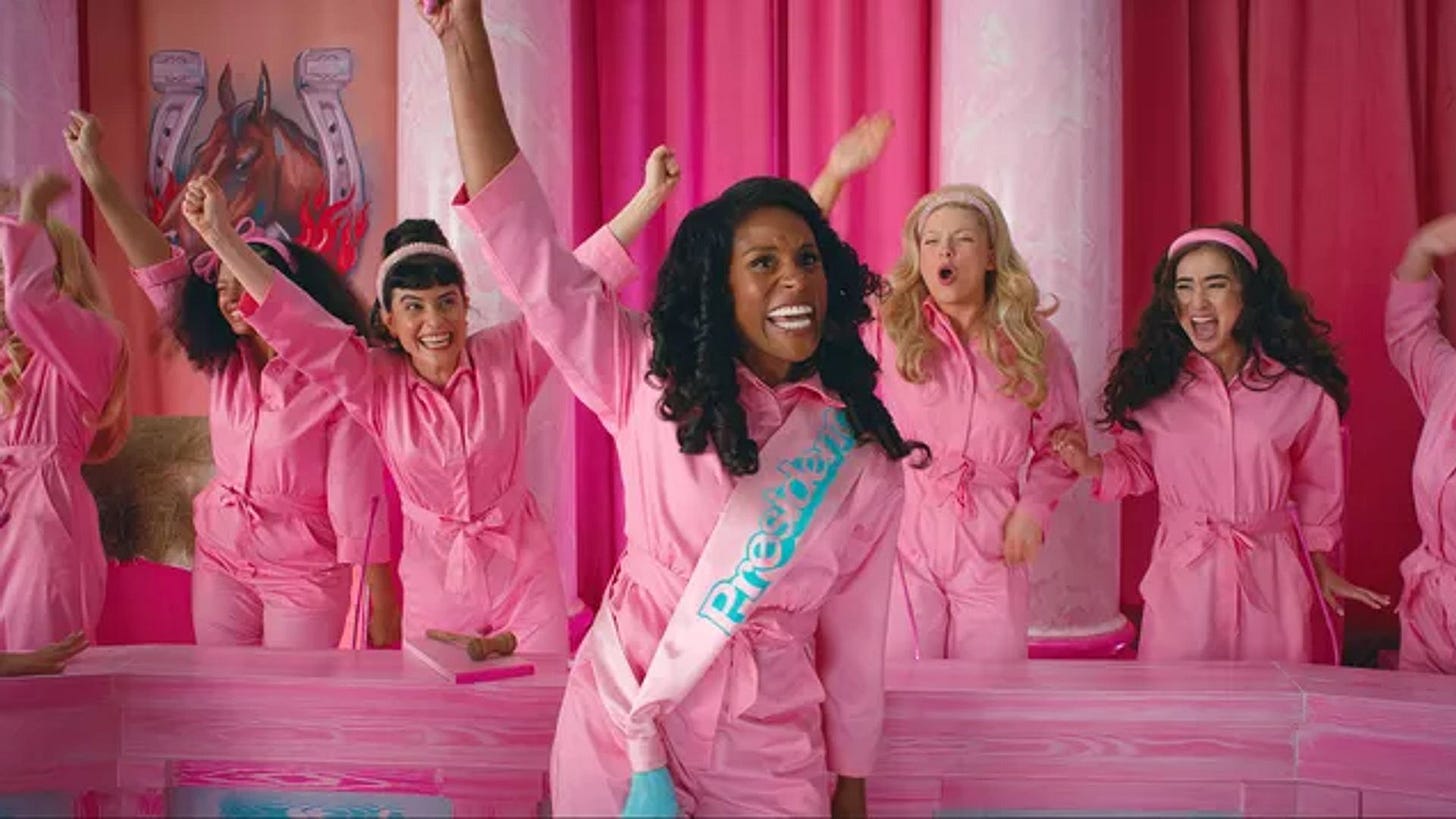In an essay titled ‘Freudian Theory’, T.W. Adorno takes a moment to describe how ‘catchy’ propaganda phrases survived in National Socialist Germany through ironic jokes made about the phrases themselves. He writes of how ‘everybody used to make fun of certain propagandistic phrases such as ‘blood and soil’ (Blut und Boden), jokingly called Blubo, or the concept of the nordic race from which the verb aufnorden (to ‘northernize’) was derived.’1 What interested him in particular was how ‘nevertheless, these appeals [did] not seem to have lost their attractiveness.’ Rather, ‘their very ‘phoniness’ may have been relished cynically and sadistically as an index for the fact that power alone decided one’s fate in the Third Reich, that is, power unhampered by rational objectivity.’
The attractiveness of these phrases, through an ironic cloaking, says less about the object being ironised, but the subject who is using irony to do it either despite the politics of the object, or because of it. In more simple terms, irony lends itself to both critiquing an object insistently on its own terms, and also to bypassing the moral, ethical checkpoint that one may encounter in adhering or consuming the object with which an ironic disposition is maintained. I am deliberate about using the words ‘adhere’ and ‘consume’, because of how it relates to fascism in particular. Adorno too asks, ‘Why is the applied group psychology discussed here peculiar to fascism rather than to most other movements that seek mass support?’ He supposes that it is the nature of fascism’s requirement to rely on repetition, with no need to ‘induce a change’, no core argument to be made, for it to work. Adherence and consumption thus signals a passivity in people, the kind that comes to mind in still-peddled theories of the ‘hypodermic syringe model’ of media consumption.
In this regard, irony’s role in fascism (and not against it) is to substitute critique for simple self-awareness about what is still being adhered to and consumed, without ever contradicting it. It is the kind that allows you to have ‘guilty pleasures’, and ‘problematic faves’, a self-given pass for having your cake and eating it too.
Irony in the hands of the culture industry is how capitalism sells us our freedom. This is not a new argument by any means, but rather understood as an implication in the various portraits and representations of capitalist realism, ‘postmodernity’, ‘late-capitalism’, ‘neoliberalism’, whatever one wishes to call it. But what is more interesting in the context of irony’s role in facilitating adherence and consumption, is the peculiarly explicit tendency in contemporary neoliberal cinema to now use ironic posturing to foster ironic consumption, ironic adherence, to show us how neoliberalism is the fascism of today.
Barbie (2023), a film made for one of the largest toy companies in the world, Mattel Inc., by an alternative cinema darling, Greta Gerwig, could not exist today without the explicit ironic posturing the film has. One could simply not make a film today sincerely depicting a Barbie girl, in a Barbie world, with all its blonde-haired-blue-eyed toxic misogyny and clearly outdated normative implication on what being A Girl In The World is. So instead, under neoliberalism—and its way of ironic, cynical, repetitive co-optation of identity politics and liberal posturing—we get an art filmmaker to ‘humanize’ Barbie on screen, we pick out the parts that overlook Mattel’s complicity in hetero-capitalist-patriarchy, and instead show how the master’s tools apparently do dismantle the master’s house.2 In Barbie, ‘Stereotypical Barbie’ who has lived her whole life in ‘Barbie land’ has an existential crisis not when she realises that all the other Barbies she lives with are more than stereotypical, and that unlike herself, those girls have degrees, careers, hobbies, and interests. Instead, her world begins to slowly fall apart when she realises that the human she assumes to be paired with in the ‘real world’ actually does not like her and has completely outgrown her.
Barbie visits the real world and discovers misogyny, catcalling, the patriarchy, and how as a toy she is not just an amulet for childhood purity for little girls, but that she is a model for which these girls are to adhere to, and moreover, be consumed themselves like Barbie. She meets her ‘human’—a teenage girl—which the Mattel produced film uses rather cynically in anticipation of critique, ironically and reflexively to admit to its complicity in capitalism.
SASHA: You represent everything wrong with our culture: sexualized capitalism, unrealistic physical ideals.
BARBIE: Whoa hang on you’re describing something stereotypical. Barbie is so much more than that.
SASHA: Look at yourself!
BARBIE: (she has a point) Well, I am, actually, Stereotypical Barbie.
SASHA: You set the feminist movement back fifty years, you destroy girls’ innate sense of worth and you’re killing the planet with your glorification of rampant consumerism.
BARBIE: But, but I’m supposed to help you and make you happy and powerful—
SASHA: —I am powerful and until you showed up here and declared yourself “Barbie”, I hadn’t thought about you in years, you FASCIST.
[...]
Barbie is sitting in the parking lot still fully weeping from her interaction with Sasha.
BARBIE: (to herself, baffled) She thinks I’m a fascist? I don’t control the railways or the flow of commerce?
In recalling the historic attribution of efficient public transportation to Mussolini’s brand of fascism, this joke appears as a rather shameless example of today’smode of ironic posturing. Barbie not only preempts and co-opts any sincere critique that could be hurled against it; it also sells itself back to us - via irony - as a mode of doing politics. To put it more simply, films like Barbie that cynically use irony to get away with bad politics seemingly tell us that for as long as our adherence and consumption is done ironically, we can substitute real politics for representation, branding, and posturing, as ideal consumerist subjects under neoliberalism. Irony here does not attack complicity - it enables it.
In the homogenous fascism of neoliberalism, we are the commodity that gets sold, our identities as content for marketing, distribution, and further consumption. Barbie shows that the patriarchy can exist through the ironization of feminism, lest sincere feminism is too angry, too angsty, too radical, too killjoy.3 Sasha, after all, is not punished, but worse, neutralised and brainwashed back into pink feminism.
It isn’t particularly modern to suggest that irony can easily lend itself to fascism, right-wing rhetoric, hetero-patriarchal-capitalism, etc. Yet there is a peculiar explicitness with which popular Hollywood—which again, by no means the bastion of our cinematic liberation—attempts to posture or parody its reflection or self-awareness of its own complicity in a way that implicitly undercuts anything that could ever be said about it. One begins to wonder whether they can truly ever tell how ironic or sincere they were being, while walking into screenings of Barbie, all dressed and truly dolled up in pink. How then do we conceive of radical, immanent critique, with or without, within or outside of irony?4
References
Adorno, T. W., ‘Freudian Theory and the Pattern of Fascist Propaganda’, in Psychoanalysis and the Social Sciences, Vol. III (Oxford, England: International Universities Press, 1951), pp. 279–300
Ahmed, Sara, ‘Killing Joy: Feminism and the History of Happiness’, Signs, 35.3 (2010), 571–94 <https://doi.org/10.1086/648513>
Jonsson, Andrea, and Heather Warren-Crow, Young-Girls in Echoland: #Theorizing Tiqqun (U of Minnesota Press, 2021) <https://doi.org/10.5749/9781452967028>
Tiqqun, Preliminary Materials for The Theory of The Young-Girl, trans. by Arianna Reines, Intervention, 12 (semiotext(e), 2012) <https://files.libcom.org/files/Preliminary%20Materials%20for%20a%20Theory%20of%20the%20Young-Girl.pdf>
Endnotes
This essay’s title is a reference to Andrea Jonsson and Heather Warren-Crow, Young-Girls in Echoland: #Theorizing Tiqqun (U of Minnesota Press, 2021) <https://doi.org/10.5749/9781452967028>.









